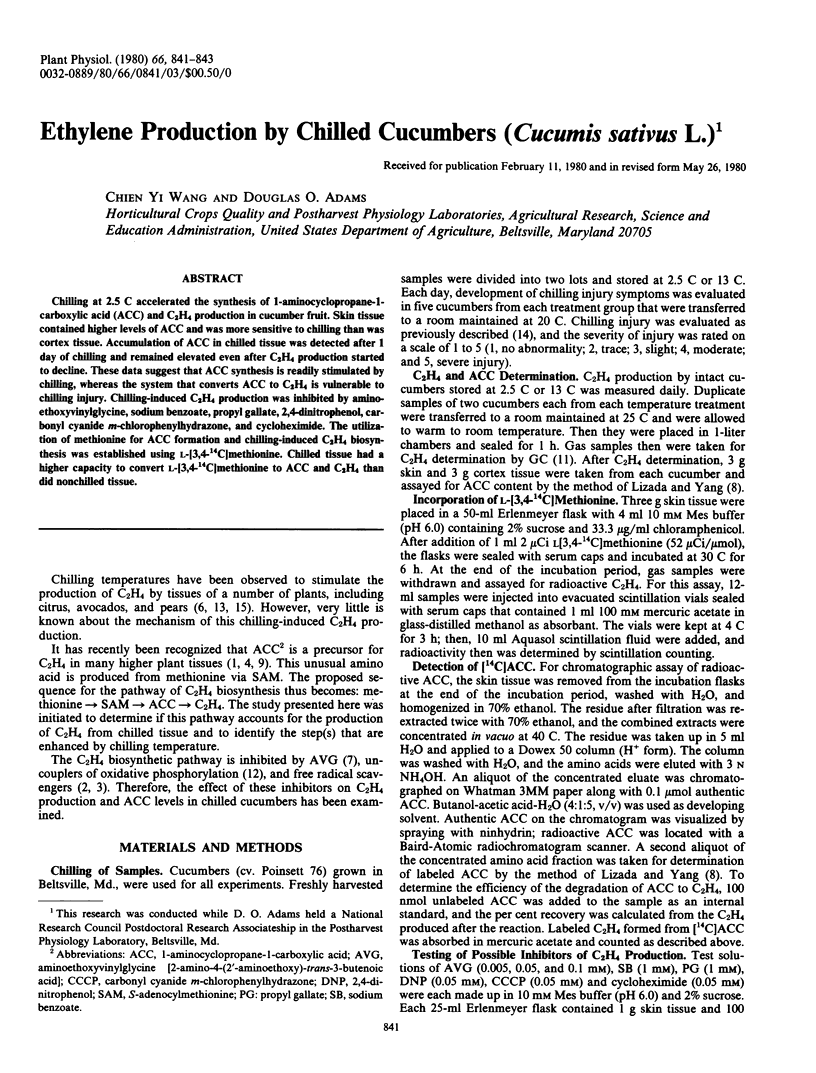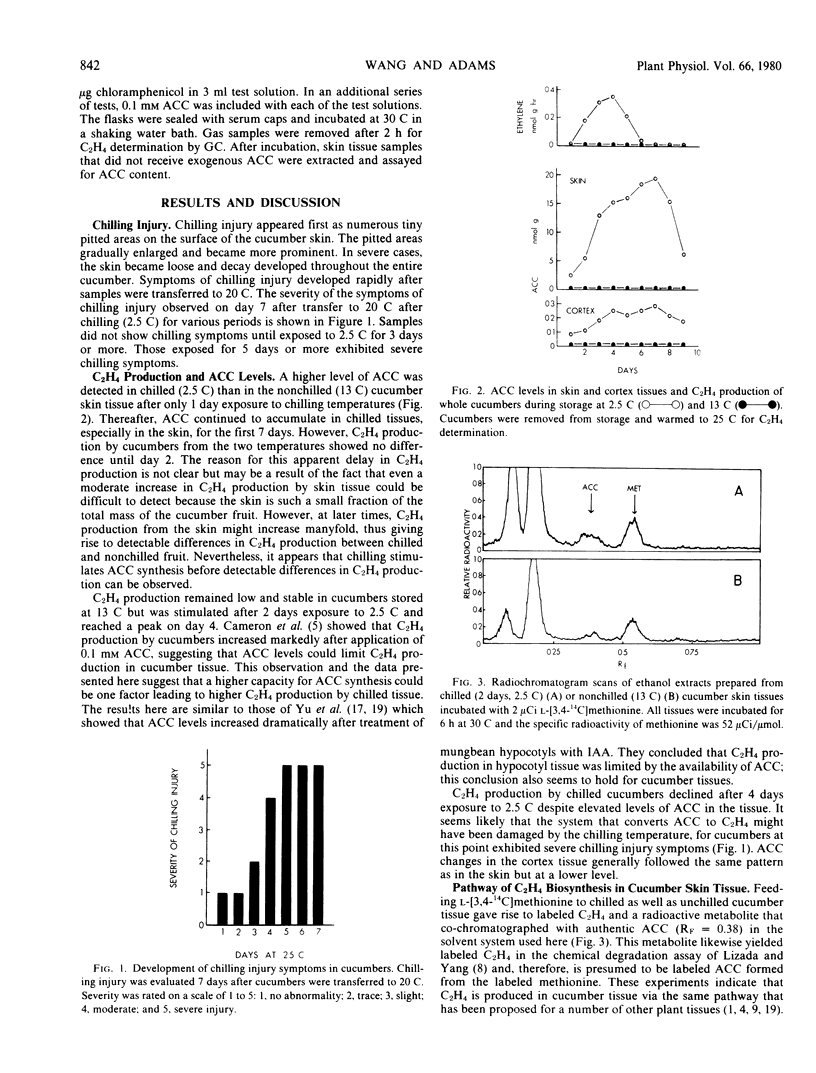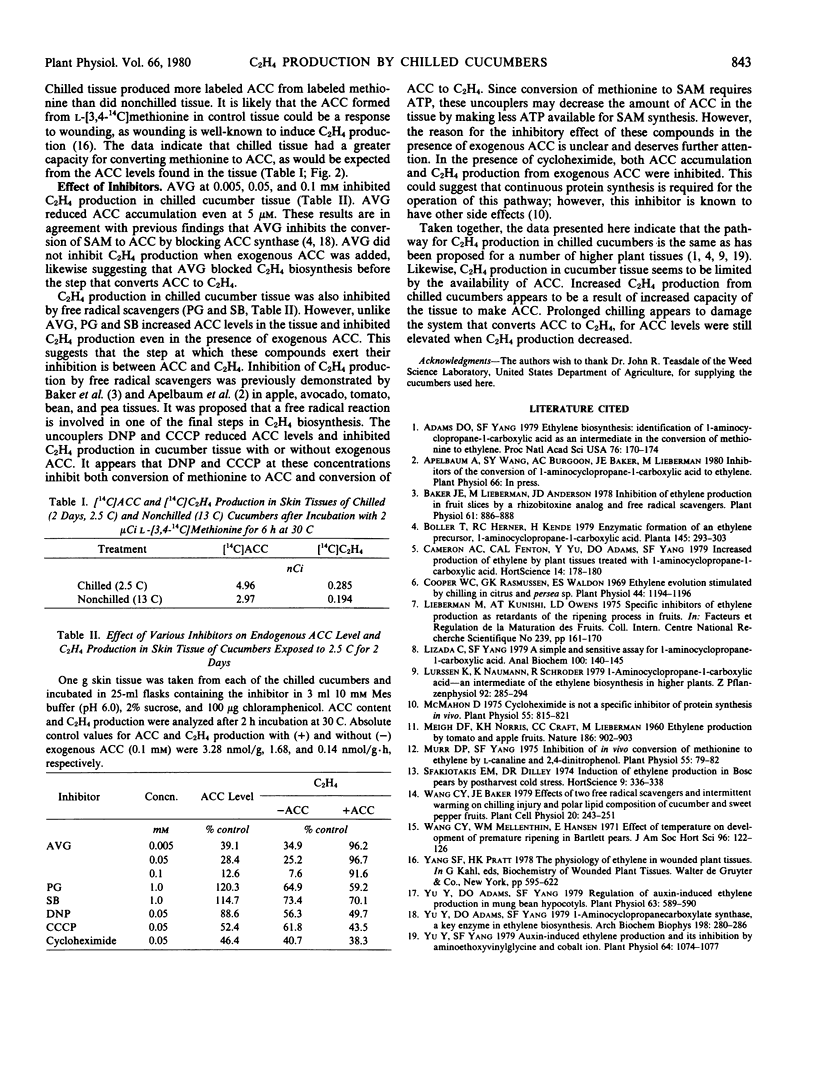Abstract
Chilling at 2.5 C accelerated the synthesis of 1-aminocyclopropane-1-carboxylic acid (ACC) and C2H4 production in cucumber fruit. Skin tissue contained higher levels of ACC and was more sensitive to chilling than was cortex tissue. Accumulation of ACC in chilled tissue was detected after 1 day of chilling and remained elevated even after C2H4 production started to decline. These data suggest that ACC synthesis is readily stimulated by chilling, whereas the system that converts ACC to C2H4 is vulnerable to chilling injury. Chilling-induced C2H4 production was inhibited by amino-ethoxyvinylglycine, sodium benzoate, propyl gallate, 2,4-dinitrophenol, carbonyl cyanide m-chlorophenylhydrazone, and cycloheximide. The utilization of methionine for ACC formation and chilling-induced C2H4 biosynthesis was established using l-[3,4-14C]methionine. Chilled tissue had a higher capacity to convert l-[3,4-14C]methionine to ACC and C2H4 than did nonchilled tissue.
Full text
PDF


Selected References
These references are in PubMed. This may not be the complete list of references from this article.
- Adams D. O., Yang S. F. Ethylene biosynthesis: Identification of 1-aminocyclopropane-1-carboxylic acid as an intermediate in the conversion of methionine to ethylene. Proc Natl Acad Sci U S A. 1979 Jan;76(1):170–174. doi: 10.1073/pnas.76.1.170. [DOI] [PMC free article] [PubMed] [Google Scholar]
- Baker J. E., Lieberman M., Anderson J. D. Inhibition of ethylene production in fruit slices by a rhizobitoxine analog and free radical scavengers. Plant Physiol. 1978 Jun;61(6):886–888. doi: 10.1104/pp.61.6.886. [DOI] [PMC free article] [PubMed] [Google Scholar]
- Cooper W. C., Rasmussen G. K., Waldon E. S. Ethylene evolution stimulated by chilling in citrus and persea sp. Plant Physiol. 1969 Aug;44(8):1194–1196. doi: 10.1104/pp.44.8.1194. [DOI] [PMC free article] [PubMed] [Google Scholar]
- Lizada M. C., Yang S. F. A simple and sensitive assay for 1-aminocyclopropane-1-carboxylic acid. Anal Biochem. 1979 Nov 15;100(1):140–145. doi: 10.1016/0003-2697(79)90123-4. [DOI] [PubMed] [Google Scholar]
- McMahon D. Cycloheximide is not a specific inhibitor of protein synthesis in vivo. Plant Physiol. 1975 May;55(5):815–821. doi: 10.1104/pp.55.5.815. [DOI] [PMC free article] [PubMed] [Google Scholar]
- Murr D. P., Yang S. F. Inhibition of in Vivo Conversion of Methionine to Ethylene by l-Canaline and 2,4-Dinitrophenol. Plant Physiol. 1975 Jan;55(1):79–82. doi: 10.1104/pp.55.1.79. [DOI] [PMC free article] [PubMed] [Google Scholar]
- Yu Y. B., Adams D. O., Yang S. F. 1-Aminocyclopropanecarboxylate synthase, a key enzyme in ethylene biosynthesis. Arch Biochem Biophys. 1979 Nov;198(1):280–286. doi: 10.1016/0003-9861(79)90420-x. [DOI] [PubMed] [Google Scholar]
- Yu Y. B., Adams D. O., Yang S. F. Regulation of Auxin-induced Ethylene Production in Mung Bean Hypocotyls: Role of 1-Aminocyclopropane-1-Carboxylic Acid. Plant Physiol. 1979 Mar;63(3):589–590. doi: 10.1104/pp.63.3.589. [DOI] [PMC free article] [PubMed] [Google Scholar]
- Yu Y. B., Yang S. F. Auxin-induced Ethylene Production and Its Inhibition by Aminoethyoxyvinylglycine and Cobalt Ion. Plant Physiol. 1979 Dec;64(6):1074–1077. doi: 10.1104/pp.64.6.1074. [DOI] [PMC free article] [PubMed] [Google Scholar]


